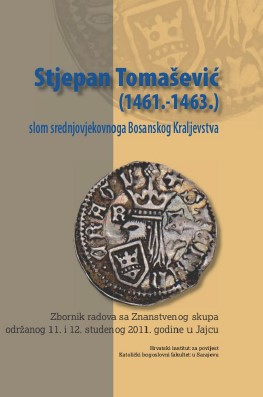Kraj srednjovjekovnog Bosanskog Kraljevstva u dubrovačkim izvorima
The End of the Medieval Bosnian Kingdom in Dubrovnik Sources
Author(s): Zdenka Janeković Römer
Subject(s): Military history, Political history, Government/Political systems, Security and defense, 15th Century, The Ottoman Empire, Peace and Conflict Studies
Published by: Hrvatski institut za povijest
Keywords: fall of Bosnian Kingdom; Stjepan Tomašević; Republic of Dubrovnik; Ottoman Empire;
Summary/Abstract: The value of Dubrovnik reports about the fall of the Bosnian Kingdom and death of King Stjepan Tomašević for the most part lies in that they record the sources and respond to them from immediate vicinity. Records of Dubrovnik councils and especially of the Senate (Consilium Rogatorum) focus, for the most part, on preparations for defense, lively diplomatic activity and aspiration to achieve a neutral position. To a smaller extent these records contain information on circumstances in Bosnia, response of the Bosnian nobility, attempts of the Bosnian king Stjepan Tomašević to organize defence and his quest to gain support of the Hungarian king, Venetians, Skenderbeg and Pope. While Dubrovnik archival documents comprise no direct information about the fall of Bosnia, they provide rich data about the rescuing of the queens Katarina and Mara as well as Bosnian nobility in the Dubrovnik region. In addition to historical data, Dubrovnik chronicles (Anonim, Nikola Ragnina, Tuberon, Razzi, Orbini, Luccari and Gundula) contain commentaries that justify the position of Dubrovnik at the moment of abrupt change in the long-standing relationship with Bosnia. The chroniclers’ opinions diverge but some of their conclusions are shared: they see the cause of the fall of Bosnia in the disproportionate size of the opposing sides, the failure of the Hungarian king and other Christian rulers to provide assistance and discordance among Bosnian nobles arising, for the most part, in religious disagreements. Turkish conquest of Bosnia radically changed the relationship between the Ottoman Empire and Republic of Dubrovnik. Yet the conditions soon found balance and tensions, conflict and crises notwithstanding, a mode of coexistence was established. Dubrovnik was directly exposed to danger, situated at the very border of the Ottoman Empire, lacking military and naval force to resist Ottoman might and dependent on the freedom of trade. In such a situation it had to lead conciliatory politics. By recognizing the new rule, Dubrovnik retained a continuity of contact with the Bosnian space in which much changed but much remained the same. Old economic and human relations lived on in the new political framework.
Book: Stjepan Tomašević (1461.-1463.) - slom srednjovjekovnoga Bosanskog Kraljevstva - Zbornik radova
- Page Range: 47-67
- Page Count: 21
- Publication Year: 2013
- Language: Croatian
- Content File-PDF

